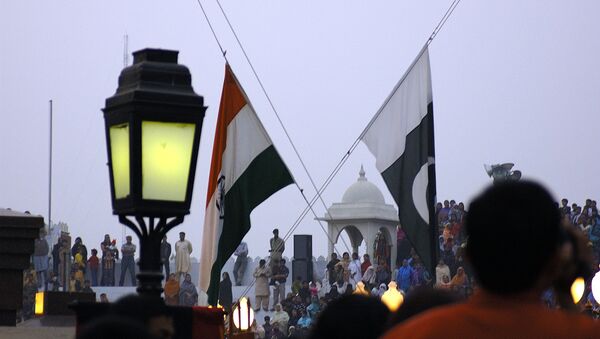The foreign ministers of India and Pakistan — Sushma Swaraj and Shah Mehmood Qureshi — recently exchanged pleasantries on the side-lines of the SCO summit in Bishkek, Kyrgyzstan, but existing strained relations between the two can improve only if Pakistan abandons its support of terror, says India's former High Commissioner to Pakistan G. Parthasarathy.
Sputnik: Prime Minister Narendra Modi has secured a massive electoral mandate to lead India for the next five years. How do you view the evolution of India's relationship with Pakistan going forward?
Parthasarathy: From our side, we will always seek the relationship to improve. But Pakistan will have to be clear that talks and terrorism cannot go together. We can have a process of engagement through envoys, or sometimes through the back channel. We can keep in touch, but for meaningful dialogue, terrorism will have to end and the infrastructure of terrorism in Pakistan has to be dismantled.
Sputnik: Do you see the prime ministers of India and Pakistan having a formal meeting or at best a pull-aside engagement on the side-lines of the SCO Summit to be held in Bishkek in mid-June?
Parthasarathy: Well, it is only natural that when the foreign ministers meet they talk. So, certainly, a multilateral meeting has already happened and generally happens, especially in forums such as the Shanghai Cooperation Organisation (SCO). So it's a good thing that we were able to exchange views, because ultimately we have to keep in touch with each other.
Sputnik: After his landslide win in the 2019 general election, Prime Minister Modi has indirectly responded to his Pakistani counterpart Imran Khan by saying that he has always given primacy to peace and development in the region around India. What is your view on this?
Parthasarathy: When Mr Modi speaks of the region, he speaks of the Indian Ocean Region (IOR). We have excellent relations with ASEAN and countries close to our maritime boundaries, like Indonesia, Singapore, and Myanmar. And to our west, certainly very good relations with the entire Arab/Gulf states, where we are building up our presence in the western side — relations with countries like Mauritius and Seychelles. Our region (Indian Ocean Region) really extends from the Straits of Malacca to the Gulf of Aden.
Sputnik: How do you view India's evolving role in Afghanistan in the event of relations improving with Pakistan and China?
Parthasarathy: We (India) have a very clear policy about Afghanistan which is not exclusively related to what Pakistan or China does. I think we would like to see an independent and stable Afghanistan which is free to choose its own path of development and its own friends. We would not be favourably disposed towards efforts just to determine the future of Afghans by the needs and necessities of foreign powers. So, as long as there is a dialogue process between Afghans across the board, which would be inclusive of all sections of Afghan society, ultimately, that is the way to peace.
Sputnik: What about India's relationship with China and the US following this electoral win and the developments post-Wuhan summit?
Parthasarathy: Post-Wuhan, you know, things have moved well because Wuhan brought down the tensions that we had during Doklam standoff. We have not had tensions along the border; cooperation has developed between the armed forces. We don't have any discriminatory restrictions against Chinese imports. So, Chinese imports and Chinese investments are growing. We don't believe in confusing the two. We have generally had good ministerial meetings with the Chinese at the level of foreign ministers. So, the Russia-India-China triangle remains very much intact. Relations with the US will improve. However, there is a concern about sanctions on our relations with countries, be it Russia or Iran. We have to deal with it.
The views and opinions expressed by the speaker are his own and do not necessarily reflect those of Sputnik.

